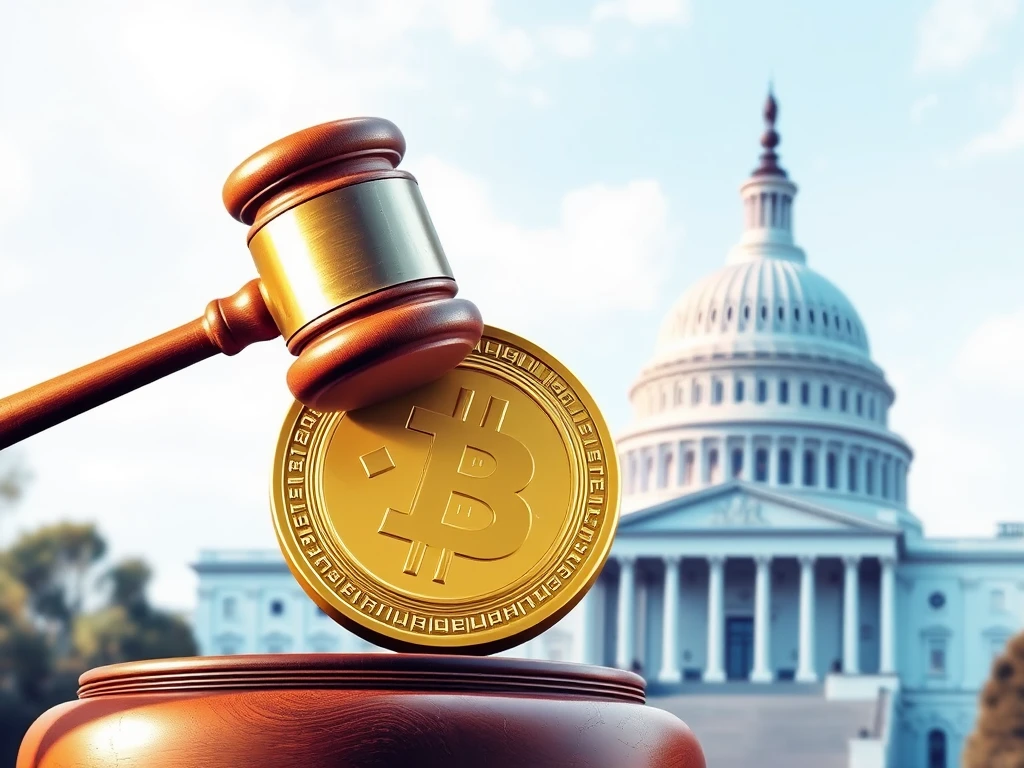Urgent Stablecoin Regulation: Key to Unlocking US Crypto Growth Before Tax Reform

Navigating the complex world of cryptocurrency in the United States? The buzz around crypto tax reform is growing, especially with increased political attention. But hold on, say industry experts – there’s a more pressing issue demanding immediate attention: stablecoin regulation. Before we even think about taxes, getting the rules right for stablecoins and clarifying banking relationships is absolutely vital for the US crypto market to truly flourish. Let’s dive into why.
Why Stablecoin Regulation Takes Priority Over Crypto Tax Reform
Industry leaders and legal minds are in agreement: the US needs to prioritize clear stablecoin regulation and banking frameworks before tackling crypto tax reform. Mattan Erder, General Counsel at Orbs, a decentralized blockchain network, emphasizes that tax rules aren’t the most urgent upgrade needed for US crypto regulation. He argues that a “tailored regulatory approach” focusing on securities laws and removing “obstacles in banking” holds “more upside” for the crypto industry right now.
Here’s why focusing on stablecoin regulation first makes sense:
- Foundation for Growth: Clear rules around stablecoins can unlock significant growth in the crypto space. They can encourage traditional financial institutions to embrace blockchain technology for payments and other services.
- Banking Access: Many crypto firms still face hurdles in accessing banking services. Addressing banking relationships in regulation is crucial for the day-to-day operations and stability of crypto businesses.
- Investor Confidence: Solid digital asset regulation, especially for stablecoins, builds trust and confidence in the market, attracting more investors and fostering innovation.
Trump Administration’s Stance: Crypto-Friendly But…
The current US administration, particularly with Donald Trump’s backing, is signaling a more crypto-friendly approach. Erder notes the administration’s proactive steps, stating they are “clearly all in on crypto” and taking actions that were “only dreamed about” previously. Trump’s executive order directing the establishment of a national Bitcoin reserve from seized crypto assets is a strong indicator of growing federal support for digital assets.
However, while executive orders can influence policy, fundamental changes to laws require Congressional action. So, while the administration can push for regulatory clarity, legislative changes are needed for long-term, comprehensive US crypto regulation, including tax frameworks.
Debanking Fears: Are They Overblown?
Despite the positive signals from the administration, concerns about “debanking” – banks cutting ties with crypto firms – persist. Caitlin Long, founder and CEO of Custodia Bank, cautions that it’s “premature to say that debanking is over.” She points out that President Trump won’t be able to appoint a new Federal Reserve governor until January 2026, suggesting potential banking access challenges for crypto firms may continue until then.
The industry’s outcry over alleged debanking intensified after a lawsuit by Coinbase revealed letters indicating US banking regulators had urged financial institutions to “pause” crypto banking activities. This highlights the ongoing tension and the need for clearer guidelines to ensure crypto businesses can access essential banking services.
How Stablecoin Legislation Can Ignite Traditional Finance Adoption
David Pakman, Managing Partner at CoinFund, believes that passing stablecoin legislation could be a game-changer. He suggests it could pave the way for greater adoption of blockchain-based payments by traditional finance giants.
Pakman explains that traditional banks and payment companies are keenly interested in using “crypto rails” because of their advantages:
- Lower Costs: Blockchain-based networks can offer more cost-effective transaction processing.
- Transparency: Blockchain provides greater transparency in financial transactions.
- 24/7 Availability: Crypto networks operate around the clock, enabling continuous transactions.
- Reduced Intermediaries: Blockchain can minimize the need for middlemen in financial transfers.
GENIUS Act: The Stablecoin Bill on the Horizon
The industry is eagerly awaiting progress on US stablecoin legislation. The GENIUS Act (Guiding and Establishing National Innovation for US Stablecoins) is a key piece of proposed legislation. Bo Hines, Executive Director of the President’s Council of Advisers on Digital Assets, suggests this legislation could advance within the next two months.
The GENIUS Act aims to:
- Establish clear collateralization guidelines for stablecoin issuers.
- Ensure full compliance with Anti-Money Laundering (AML) laws.
The Path Forward: Regulation Before Taxation
While crypto tax reform is undoubtedly important, experts are signaling a clear message: establishing robust stablecoin regulation and resolving banking access issues are the immediate priorities for the US crypto industry. These foundational elements are essential to unlock growth, foster innovation, and attract wider adoption of digital assets. By addressing these regulatory gaps first, the US can create a more stable and fertile ground for the crypto market to thrive, making any future tax reforms more effective and beneficial for all stakeholders.







